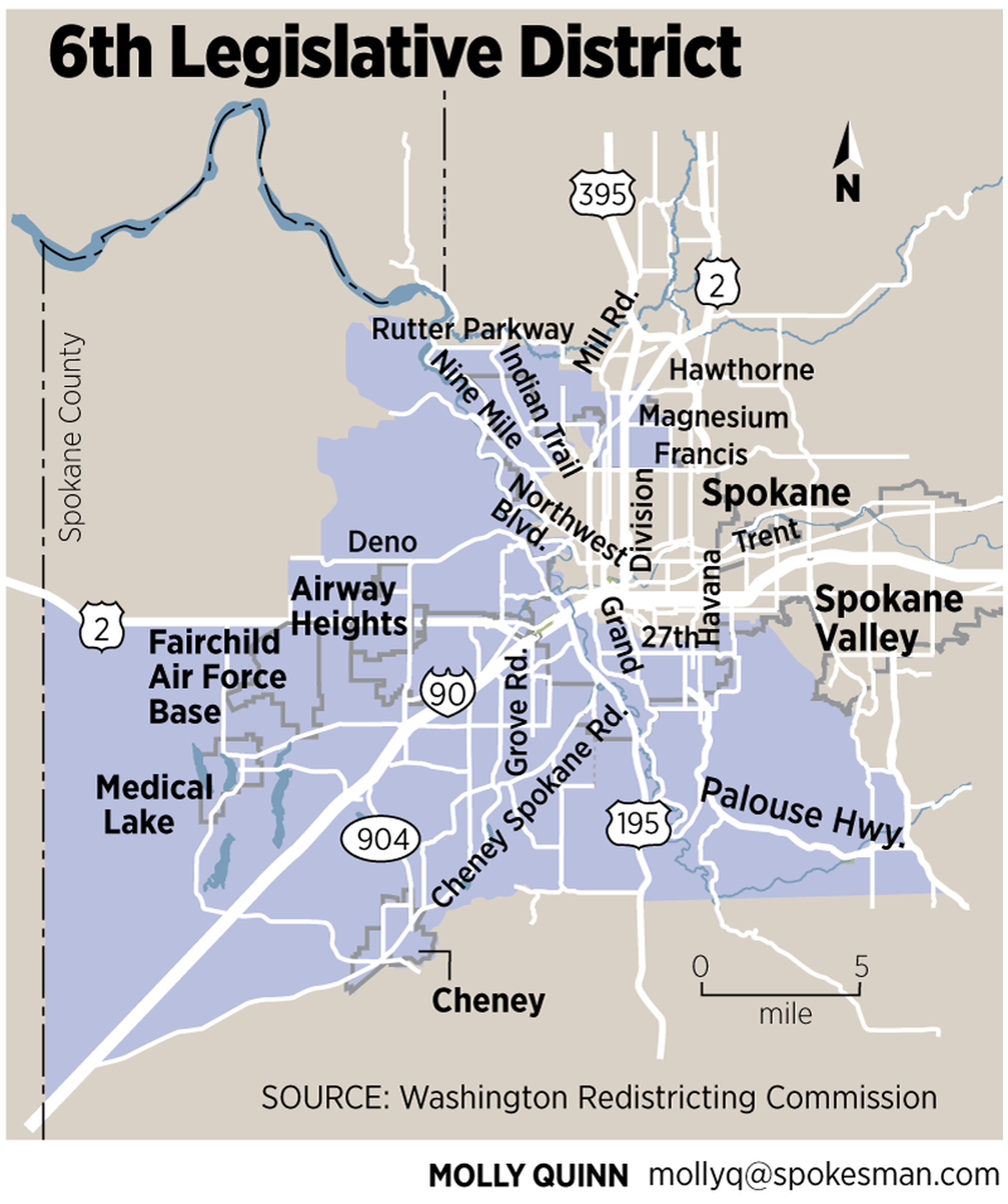Washington’s 6th District draws five challengers to succeed Rep. Kevin Parker
Republican Kevin Parker on election night in 2008 when he won his first term in the state Legislature. Parker, who went on to win three more terms, announced earlier this year that he would not seek re-election. (Colin Mulvany / The Spokesman-Review)Buy a print of this photo
The GOP has its sights set on retaining the seat longtime lawmaker Kevin Parker leaves behind, while a Democrat and an independent are hoping to flip the district with promises of a new approach to policymaking.
It’s a truism in politics that a race without an incumbent will draw wide interest. The five candidates seeking to replace Parker, the Republican lawmaker who is finishing his fourth and final term as a voice of Washington’s 6th Legislative District, know they will have to distinguish themselves from the pack, particularly the three men running as Republicans.
“This election or the next, there’s going to be a big shift from baby boomers to millennials,” said 26-year-old Ian Field, a former staffer for U.S. Rep. Cathy McMorris Rodgers. Parker has endorsed Field as his successor.
Field isn’t the only one throwing around the generational buzzword. Samuel Canty, the 27-year-old owner of a Nothing Bundt Cakes franchise on the South Hill, said he’s been encouraged by the response he’s received to his candidacy.
“People don’t think politics is a young person’s game,” said Canty, who was adopted at age 2 as an orphan in Romania and moved to Spokane in 2013. “They’re just excited that you’re interested.”
The Republican field is rounded out by Mike Volz, 51, the chief deputy treasurer for Spokane County and former assistant finance director for the Spokane Transit Authority. Volz said his experience with bookkeeping and his small-government philosophical bent sets him apart from his opponents.
“People are working their butts off for less and less,” Volz said, adding he’d have “a very hard time” supporting any measure in the Legislature that would raise taxes.
Lynnette Vehrs, a retired nurse and educator at Washington State University, will seek to be the first Democrat elected to the House of Representatives from the 6th District since John Driscoll served from 2009 to 2010.
Vehrs, 61, said she’ll build on relationships with Democratic lawmakers Andy Billig, Timm Ormsby and Marcus Riccelli, and her focus will be on health care laws.
“Here, in our state, if you get sick there’s a strong possibility you become poor,” she said.
“I want patients before profits,” Vehrs added, saying she believes the state needs to take a “serious look” at universal health care.
Barry Pfundt, a 42-year-old attorney with the Center for Justice and Gonzaga Law professor, said he joined the ticket as an independent because he was disappointed with the candidates the major parties fielded.
“I think people are pretty used to Olympia not addressing the big issues,” said Pfundt, who focuses on housing and pairing low-income residents with public services at the nonprofit Center for Justice. “I didn’t see anyone who was going to change that.”
The Legislature has avoided its responsibilities on issues such as education, taxation and mental health care, Pfundt said, and has scapegoated the Supreme Court and activists such as Tim Eyman for forcing a response.
“We nibble around the edges, and it’s the same people at the table,” Pfundt said.
Republicans Field and Volz have split endorsements from the area’s conservative lawmakers in the lead-up to the Aug. 2 primary. The top two vote-getters, regardless of party, will advance to the Nov. 8 general election.
Field’s backers include Parker, Spokane Mayor David Condon, Spokane police Law Enforcement Director Jim McDevitt and Spokane County Prosecutor Larry Haskell. Field has raised the most money of any candidate in the field, with contributions of nearly $49,000 through Wednesday, nearly twice that of Vehrs, who has raised more than $24,000.
“I’ve been in the room, as elected leaders have been working to identify issues in the community,” Field said, referring to his time as an aide with McMorris Rodgers. “I understand the issues. I think people want to live in a community that has low taxes and great jobs.”
Volz, who has been endorsed by state lawmakers including Rep. Matt Shea, Rep. Jeff Holy and Sen. Mike Padden, as well as local officials Sheriff Ozzie Knezovich and County Commissioner Al French, said he would focus on policies that make Spokane economically competitive with its neighbors. The candidate pointed to commercial development in Post Falls and the loss of sales tax dollars to Idaho as evidence current policies aren’t working.
“You’ve got people coming from Spokane, hitting Wal-Mart and filling up with gas,” Volz said. “That’s a net negative to Washington.”
Canty said he’d seek to give small businesses more opportunities to grow their income, including doing away with the business and occupation tax that is based on revenue in favor of a structure like that used in other states, which allows for deductions based on labor and other expenses. He’d also focus on expanding options for foster children who are aging out of programs offered by the Department of Social and Health Services.
“We can afford to improve,” Canty said. “Whether that’s a higher number of case workers, or funding housing for these kids.”
Pfundt, too, said he’d do away with the business and occupation tax as part of larger tax reform. Vehrs, the Democrat, said she was in favor of the capital gains tax, which targets investment earnings.
The 6th District encompasses much of the West Plains and portions of Spokane’s South Hill, stretching north along the Spokane River up to Nine Mile Falls and east to include portions of neighborhoods around the Division Street “Y.”

